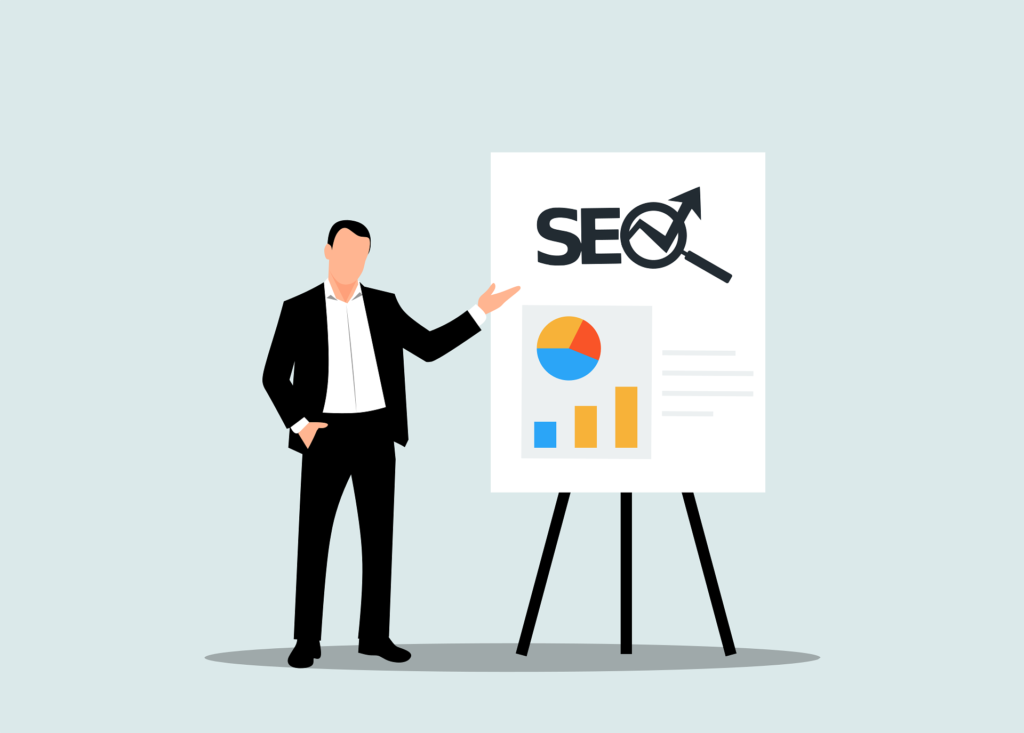Over 90% of consumers now rely on the internet to discover and engage with local businesses (source). Think about that for a moment.
Today, as a small business owner, the survival and growth of your business depend on more than just bricks and mortar. It’s about thriving online where your customers spend a significant chunk of their time.

In this article, we’ll explore why small businesses need websites.
The Power of an Online Presence
Today, Earth boasts a staggering 5.3 billion internet users (source). To put it into perspective, that’s more than half of the global population firmly tethered to the internet. It’s not just a number; it’s a seismic shift in how we live, communicate, and, importantly, how we shop and do business.
But here’s where the plot thickens. It’s not just about people being connected; it’s about how they use this connection.
In fact, a mind-boggling 81% of consumers now kickstart their buying journey with a little online reconnaissance (source), whether they intend to purchase online or head to a brick-and-mortar store. In other words, the digital landscape isn’t just growing; it’s fundamentally altering the way businesses and consumers interact.
No fluff, no exaggeration, just a powerful reminder that this digital revolution isn’t a spectator sport. It’s a game-changer.
Why Small businesses Need Websites
Having explored the power of an online presence, let’s get right into why small businesses need websites, underpinned by some eye-opening statistics.

1. Online Presence and Branding
Your website is more than a digital business card; it’s a platform where you craft your brand’s identity. Surprisingly, consistent brand presentation across all platforms can increase your revenue by up to 23% (Source).
Your website is the epicenter of this brand consistency, where you can tell your unique story, convey your values, and build a deeper connection with your audience. It’s where you define who you are and why you matter.
Let’s face it; recognition isn’t a one-time deal. It takes multiple impressions to etch your brand into your customers’ minds. Studies tell us that it takes around 5 to 7 impressions for consumers to recognize your brand.
Your website provides a consistent touch point for these impressions. It’s where potential customers revisit to learn more, reinforcing their familiarity with your brand.
2. Cost-Effective Marketing
In an era where marketing costs can quickly spiral out of control, your website emerges as a cost-effective superhero.
Traditional marketing methods often come with hefty price tags. For example, did you know that the average cost per click (CPC) for Google Ads can range from $1 to $2? In contrast, digital marketing through your website offers targeted, cost-effective options like content marketing, where costs per lead can be as much as 62% lower than traditional marketing (source).
Return on investment (ROI) is the holy grail of marketing, and websites deliver it in spades. For every dollar spent on email marketing, the average ROI is $36 (source). Your website acts as the hub for such cost-effective marketing channels, ensuring your marketing dollars work smarter, not harder.
3. Accessibility and Convenience
Today, customers don’t adhere to a 9-to-5 schedule, and neither should your business. Your website is your tireless salesperson, available round the clock, allowing customers to engage with your products or services whenever it suits them.
In 2018, a whopping 87% of shoppers began their product searches online (source). Whether they’re seeking information, comparing options, or making purchases, the internet is where they start their journey. Your website ensures you’re not only part of that journey but leading it.
Going digital, accessibility and convenience are the names of the game. In a world where people expect information and services at their fingertips, this accessibility is your ticket to engaging with a global audience, even while you sleep.
4. Trust and Credibility
Today, trust is the currency, and your website is the vault where you store it.
Trust isn’t built overnight, but your website provides the foundation. It’s not just about aesthetics; it’s about the perception of professionalism, reliability, and authenticity. Research shows that 48% of people cited a website’s design as the number one factor in deciding the credibility of a business.
Furthermore, 94% of consumers cite website design as the reason they mistrust or reject a website (source). A professional and well-designed website isn’t just a digital address; it’s a signal that you mean business, and you’re here to stay.
5. Competitive Advantage
Standing out in the digital crowd is no easy feat, but it’s essential. Surprisingly, approximately 28% of small businesses still lack a website (source). By having one, you’re already ahead of a significant chunk of your competition.
A website isn’t just a checkbox; it’s a competitive advantage. It is where you can display your expertise, products, and unique offerings, giving you the opportunity to stand out amidst the competition and capture the attention of your target audience.
How To Build A Website for Your Small Business
Now that we’ve explored why small businesses need websites, let’s roll up our sleeves and delve into the nitty-gritty of creating or enhancing your digital presence.

Here are some practical tips and steps to guide small business owners on this journey to a stronger online foothold.
- Define Your Objectives: Start with a clear understanding of what you want to achieve with your website. Is it to showcase your products, offer online sales, share valuable content, or provide essential information? Your objectives will shape the design and functionality of your website.
- User-Focused Design: Keep the user experience front and center. Your website should be easy to navigate, responsive on mobile devices, and visually appealing. User-friendly design builds a connection and keeps visitors coming back.
- Quality Content: Content is king on the web. Create high-quality, engaging content that resonates with your target audience. This can include blog posts, videos, images, and product descriptions. Valuable content not only informs but also positions you as an authority in your field.
- Optimize for SEO: Search Engine Optimization (SEO) is crucial for your website’s visibility. Use relevant keywords, meta tags, and quality backlinks to improve your search engine ranking. Appearing on the first page of search results can significantly boost your online presence.
- Encourage Interaction: Make it easy for visitors to connect with you. Include clear calls-to-action, contact forms, and social media links. Engage with your audience through comments and discussions to foster a sense of community.
- Professional Help: While there are website builders that allow you to create your site independently, consider the advantages of having your website built by a professional. Their expertise ensures that your site is not just functional but also designed to maximize its impact.
- Regular Updates: Your website is not a one-and-done project. Regularly update your content, check for broken links, and ensure all features are running smoothly. An up-to-date website reflects your commitment to your brand and your customers.
- Analytics: Use website analytics to monitor your site’s performance. Tools like Google Analytics provide insights into user behavior, helping you make data-driven decisions to improve your site continually.
Conclusion
The world has gone digital, so should your business. Harnessing the power of an online presence is your linchpin for success, and a website is where you can showcase your brand, reach new customers, build trust, and gain a competitive edge.
The above statistics aren’t just cold numbers; they underscore the power of an online presence and why small businesses need websites. As a small business owner, the time to invest in your online presence is now.


I believe I saw you visit my site, so I’m here to return the favor! I’m always on the lookout for ways to improve my own website, and your content has given me some great ideas.